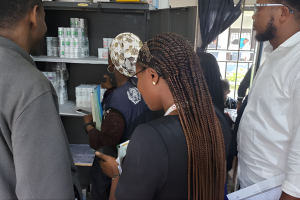Nigeria accelerating action to expand HIV prevention options with long-acting injectable PrEP
Nigeria is accelerating its efforts to eradicate AIDS as a public health threat by 2030. Until recently, HIV prevention primarily depended on daily oral pre-exposure prophylaxis (PrEP). The introduction of long-acting injectable PrEP is expected to broaden access, provide more options, and help bridge prevention gaps — supporting both national and global HIV objectives.
With technical support from the World Health Organization (WHO) and funding from the Global Fund, the National AIDS, Viral Hepatitis and STIs Control Programme (NASCP), in collaboration with the National Agency for the Control of AIDS (NACA), HIV implementing partners, and representatives of people living with or at substantial risk of HIV, conducted a PrEP landscape and site-readiness assessment in over 70 public health facilities across 10 states. The exercise reviewed existing delivery platforms, assessed readiness for implementing multiple PrEP options, and provided evidence to guide national planning.
“This assessment offers key insights on integrating injectable PrEP into public health services,” said Dr. Bashorun, NASCP Coordinator. “We aim to ensure HIV prevention tools serve diverse populations and meet national goals.”
Expanding Access and Choice
Daily oral PrEP has been available in Nigeria since 2016, but uptake varies. Adherence issues like pill fatigue, stigma, limited awareness, and inconsistent access have hindered wider use.
Newer PrEP options include injections that last two or six months, providing an alternative for those who prefer less frequent dosing and may overcome many barriers of daily oral use.
“My partner is HIV-positive, and I’m negative,” said Effiong (surname withheld), 52, from Ugep, Cross River State. “Taking pills daily is hard. If available and affordable, I’d prefer the injection — it would give me peace of mind.”
Hauwa, 28, from Gombe, added: “My work puts me at high risk of contracting HIV. If injectable PrEP can protect me, I’m ready to take it.”
WHO advises providing a variety of PrEP options tailored to individual preferences and risk profiles as part of comprehensive HIV prevention. Evidence indicates that long-acting injectable PrEP substantially lowers the risk of HIV acquisition and is particularly effective for those who struggle with daily adherence.
Strengthening Systems for Implementation
The 10-state assessment, supported by WHO, reviewed key service components such as availability, screening, supply chain, health worker capacity, and data management. The findings will inform:
• Identification of barriers and enablers to equitable PrEP access.
• Phased introduction of injectable PrEP in public health facilities.
• Integration of PrEP within broader health service platforms.
Currently, PrEP in Nigeria targets populations at substantial risk of HIV infection, including:
• Individuals in serodiscordant relationships (where one partner is HIV-positive and the other is negative).
• People recently diagnosed with sexually transmitted infections or who have multiple sexual partners.
• Pregnant and breastfeeding women in serodiscordant relationships or at high risk of infection, to prevent mother-to-child transmission.
• Vulnerable and key populations, including sex workers and men who have sex with men.
Integration into routine services remains key to Nigeria’s prevention, enabling clients to access PrEP at familiar points like antenatal clinics, family planning units, and outreach programmes.
“We must ensure HIV prevention services are client-centred and accessible to everyone who needs them,” said Dr Bashorun. “Injectable PrEP adds an important option to help close prevention gaps.”
WHO Support and Next Steps
WHO continues to provide technical support to Nigeria’s HIV programme, including capacity-building, policy development, and integration of PrEP into sexual and reproductive health services. The Organization also assists in developing national guidelines and monitoring systems to ensure safe, effective, and equitable roll-out.
“Embedding PrEP into existing health services — such as sexual and reproductive health clinics and community-based outreach — is essential for sustainability,” said Dr Oluwafunke Odunlade, WHO HIV, Viral Hepatitis, and STI Technical Officer in Nigeria. “Integration strengthens health systems and ensures prevention reaches people where they already seek care.”
